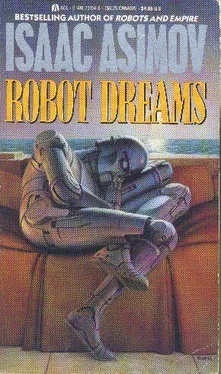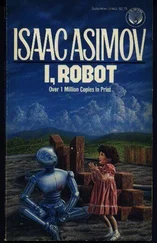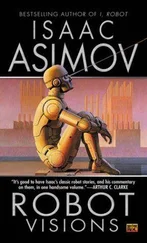Isaac Asimov - Robot Dreams
Здесь есть возможность читать онлайн «Isaac Asimov - Robot Dreams» весь текст электронной книги совершенно бесплатно (целиком полную версию без сокращений). В некоторых случаях можно слушать аудио, скачать через торрент в формате fb2 и присутствует краткое содержание. Город: New York, Издательство: Ace Books, Жанр: Фантастика и фэнтези, на английском языке. Описание произведения, (предисловие) а так же отзывы посетителей доступны на портале библиотеки ЛибКат.
- Название:Robot Dreams
- Автор:
- Издательство:Ace Books
- Жанр:
- Год:неизвестен
- Город:New York
- ISBN:нет данных
- Рейтинг книги:4 / 5. Голосов: 1
-
Избранное:Добавить в избранное
- Отзывы:
-
Ваша оценка:
- 80
- 1
- 2
- 3
- 4
- 5
Robot Dreams: краткое содержание, описание и аннотация
Предлагаем к чтению аннотацию, описание, краткое содержание или предисловие (зависит от того, что написал сам автор книги «Robot Dreams»). Если вы не нашли необходимую информацию о книге — напишите в комментариях, мы постараемся отыскать её.
Robot Dreams — читать онлайн бесплатно полную книгу (весь текст) целиком
Ниже представлен текст книги, разбитый по страницам. Система сохранения места последней прочитанной страницы, позволяет с удобством читать онлайн бесплатно книгу «Robot Dreams», без необходимости каждый раз заново искать на чём Вы остановились. Поставьте закладку, и сможете в любой момент перейти на страницу, на которой закончили чтение.
Интервал:
Закладка:
Isaac Asimov
Robot Dreams
Introduction
Science fiction has certain satisfactions peculiar to itself. It is possible, in trying to portray future technology, to hit close to home. If you live long enough after writing a particular story, you may actually have the pleasure of finding your predictions reasonably accurate and yourself hailed as a sort of minor prophet.
This has happened to me in connection with my robot stories, of which "Light Verse" (included here) is an example.
I began writing robot stories in 1939, when I was nineteen years old, and, from the first, I visualized them as machines, carefully built by engineers, with inherent safeguards, which I called "The Three Laws of Robotics." (In doing so, I was the very first to use the word "robotics" in print, this taking place in the March, 1942 issue of Astounding Science Fiction.) As it happened, robots of any kind were not really practical until the mid-1970s when the microchip came into use. Only that made it possible to produce computers that were small enough and cheap enough, while possessing the potentiality for sufficient capacity and versatility, to control a robot at nonprohibitive expense.
We now have machines, called robots, that are computer-controlled and are in industrial use. They increasingly perform simple and repetitious work on the assembly lines – welding, drilling, polishing and so on – and they are of increasing importance to the economy. Robots are now a recognized field of study and the precise word that I invented is used for it – robotics.
To be sure, we are only at the very beginning of the robotic revolution. The robots now in use are little more than computerized levers and are very far from having the complexity necessary for the Three Laws to be built into them. Nor are they anything close to human in shape, so they are not yet the "mechanical men" that I have pictured in my. stories, and that have appeared on the screen innumerable times.
Nevertheless, the direction of movement is clear. The primitive robots that have come into use are not the Frankenstein-monsters of equally primitive science fiction. They do not lust for human life (although accidents involving robots can result in human death, just as accidents with automobiles or electrical machinery can). They are, rather, carefully designed devices intended to relieve human beings of arduous, repetitive, dangerous, nonrewarding duties so that, in intent and in philosophy, they represent the first steps toward my story – robots.
The steps that are yet to come are expected to proceed further in the direction I have marked out. A number of different firms are working on "home robots" that will have a vaguely human appearance and will fulfill some of the duties that once devolved on servants.
The result of all this is that I am held in considerable regard by those working in the field of robotics. In 1985, a fat encyclopedic volume entitled Handbook of Industrial Robotics (edited by Shimon Y. Nof and published by John Wiley) appeared, and, on request of the editor, I supplied it with an introduction.
Of course, in order to appreciate the accuracy of my predictions, I had to be fortunate enough to be a survivor. My first robots appeared in 1939, as I say, and I had to live for over forty more years in order to discover I was a prophet. Because I had begun at a very early age, and because I was fortunate, I managed to do this and words cannot tell you how grateful I am for that.
Actually, I carried on my predictions of the future of robotics to the very end, to the ultimate moment, in my story "The Last Question," published in 1957. I have a sneaking suspicion that, if the human race survives, we may continue to progress in that direction in some ways anyway. Still, survival is limited at the best, and I have no chance of seeing very much more of the future course of technology. I will have to content myself with having future generations witness and (I hope) applaud what triumphs of this sort I may gain. I, myself, won’t, Nor are robots the only area in which my crystal ball was clear. In my story "The Martian Way," published in 1952, I described a space walk quite accurately, although an actual feat of this sort didn’t take place till fifteen years afterward. Foreseeing space walks was not a very daring piece of prescience, I admit, for, given spaceships, such things would be inevitable. However, I also described the psychological effects and thought of one that was rather unusual – particularly for me.
I am, you see, a pronounced acrophobe with an absolute terror of heights and know perfectly well that I will never voluntarily go on a spaceship. If, however, I were somehow forced on one, I know, too, that I would never dare leave it for a space walk. Nevertheless, I put personal fear to one side and imagined the space walk to produce euphoria. I had my space travelers quarrel over whose turn it was to get out into space and drift in quiet peace among the stars. And when space walks became fact, such euphoria was felt.
In my story, "The Feeling of Power," published in 1957, I made use of pocket computers, about a decade before the real thing came along. I even considered the possibility that such computers might seriously decrease the ability of people to do arithmetic in the old-fashioned way, and that is a real concern of educators now.
As a final example, in my story "Sally," published in 1953, I described computerized cars that had almost reached the stage of having lives of their own. And, in the last few years, we do indeed have computerized cars that can actually talk to the driver – although their abilities in this direction are, as yet, very simple.
Yet, if there is the possibility of this satisfaction from accurate prophecy in science fiction, there is also the reverse. Science fiction offers its writers chances of embarrassment that no other form of fiction does.
After all, if we may prove accurate in our predictions, we may prove inaccurate as well, sometimes ludicrously so.
Such embarrassment becomes particularly acute when one’s stories are reprinted in a collection such as this one. When an author starts young, lives out a normal lifetime (as I seem to be doing) and has written continuously, there is likely to be included in the collection stories that were written and published thirty and forty years before and that leave ample scope for any cloudiness in the crystal ball to show up.
This doesn’t happen to me as often as it might, for I have several things going for me. In the first place, I am well acquainted with science and am not likely to be wrong in fundamentals. Secondly, I am cautious in my predictions and do not flail away madly in contravention of scientific principles.
Nevertheless, science does advance and sometimes produces completely unexpected results in a very few years, and this may leave a writer (even me) high and dry on a pinnacle of false "facts. " The worst luck I had in this respect turned up in connection with a series of science fiction novels I wrote for youngsters between 1952 and 1958.
That series dealt with the continuing adventures of my heroes on various planets of the solar system, and in each case, I carefully described the planets in strict accordance with what was known about them at the time.
Unfortunately, it was in the course of those very years that microwave astronomy was developed and shortly after those years that rocket probes began to be sent out. The result was that our knowledge of the solar system was startlingly advanced and we learned something new and unexpected about every single planet.
For instance, in my description of Mercury in Lucky Starr and the Big Sun of Mercury, I had it facing one side to the Sun, as astronomers then thought – and that was essential to the plot. As it happens, however, we now know that Mercury turns slowly and that every portion of its surface gets sunlight part of the time. There is no "dark side."
Читать дальшеИнтервал:
Закладка:
Похожие книги на «Robot Dreams»
Представляем Вашему вниманию похожие книги на «Robot Dreams» списком для выбора. Мы отобрали схожую по названию и смыслу литературу в надежде предоставить читателям больше вариантов отыскать новые, интересные, ещё непрочитанные произведения.
Обсуждение, отзывы о книге «Robot Dreams» и просто собственные мнения читателей. Оставьте ваши комментарии, напишите, что Вы думаете о произведении, его смысле или главных героях. Укажите что конкретно понравилось, а что нет, и почему Вы так считаете.








